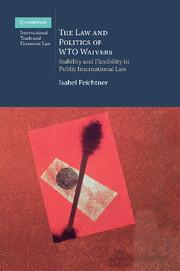Book contents
- Frontmatter
- Contents
- Acknowledgements
- 1 Why study the WTO waiver?
- Part I The stability/flexibility challenge in public international law and particularly the WTO
- Part II The practice and law of waivers
- 4 The waiver power and practice of the GATT 1947 and the WTO
- 5 The law of waivers
- Part III The potential of waivers to address the stability/flexibility challenge in international law
- Bibliography
- Index
- References
4 - The waiver power and practice of the GATT 1947 and the WTO
Published online by Cambridge University Press: 05 December 2011
- Frontmatter
- Contents
- Acknowledgements
- 1 Why study the WTO waiver?
- Part I The stability/flexibility challenge in public international law and particularly the WTO
- Part II The practice and law of waivers
- 4 The waiver power and practice of the GATT 1947 and the WTO
- 5 The law of waivers
- Part III The potential of waivers to address the stability/flexibility challenge in international law
- Bibliography
- Index
- References
Summary
A. THE WAIVER POWER OF THE GATT 1947 AND THE WTO
The WTO's waiver power is found in Art. IX:3 of the Agreement Establishing the WTO (WTO Agreement). It allows the Ministerial Conference ‘[i]n exceptional circumstances…to waive an obligation imposed on a Member by this Agreement or any of the Multilateral Trade Agreements, provided that any such decision shall be taken by three-fourths of the Members’. The waiver power in Art. IX:3 WTO Agreement supersedes the waiver power in Art. XXV:5 GATT. Under the GATT 1947 this power enabled the contracting parties, acting jointly, to suspend GATT obligations by a two-thirds majority which comprised more than half of the contracting parties.
The waiver power of the GATT 1947 goes back to the United States ‘Suggested Charter for an International Trade Organization’ (1946). This draft charter provided for a waiver power in Art. 55:2. According to this provision the Conference – the plenary organ of the organization – was to be granted the competence to waive obligations in Chapter IV of the draft charter, i.e. tariffs and customs obligations. During the Preparatory Conference in London it was agreed, upon a proposal of the French delegate, to extend this waiver power to all obligations under the charter. From the travaux préparatoires of the London Conference it appears that the waiver power was intended as an emergency exception to allow for a temporary suspension of obligations if none of the other escape clauses applied. The general waiver power became Art. 77:3 of the Havana Charter. In the GATT the waiver power was included in Art. XXV:5 GATT.
- Type
- Chapter
- Information
- The Law and Politics of WTO WaiversStability and Flexibility in Public International Law, pp. 58 - 162Publisher: Cambridge University PressPrint publication year: 2011

